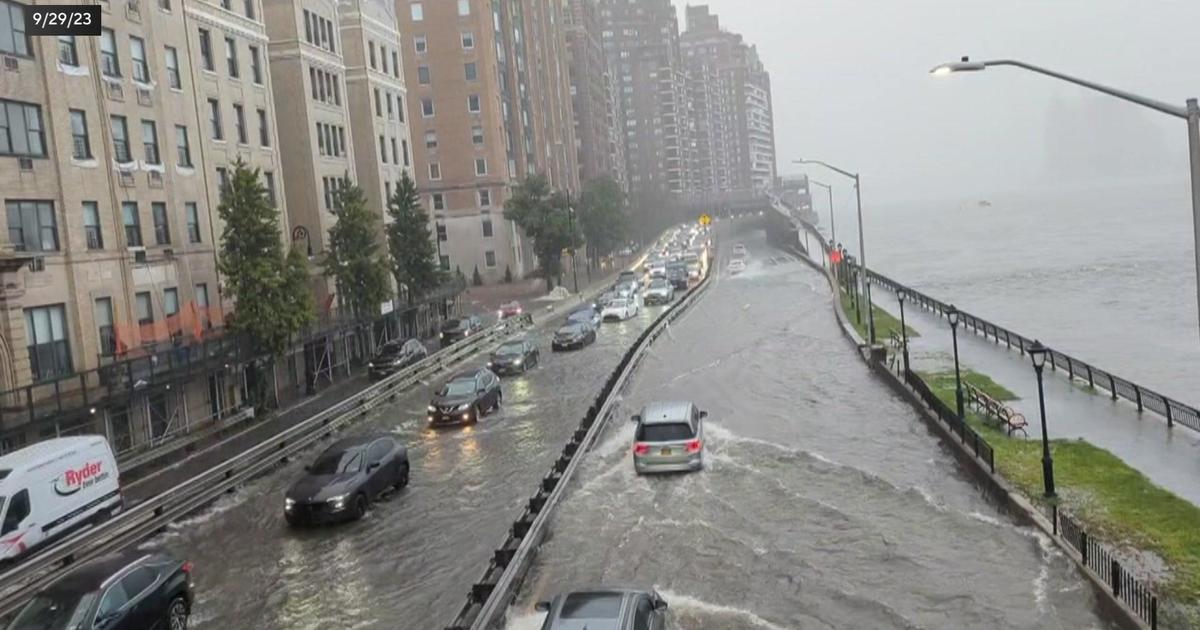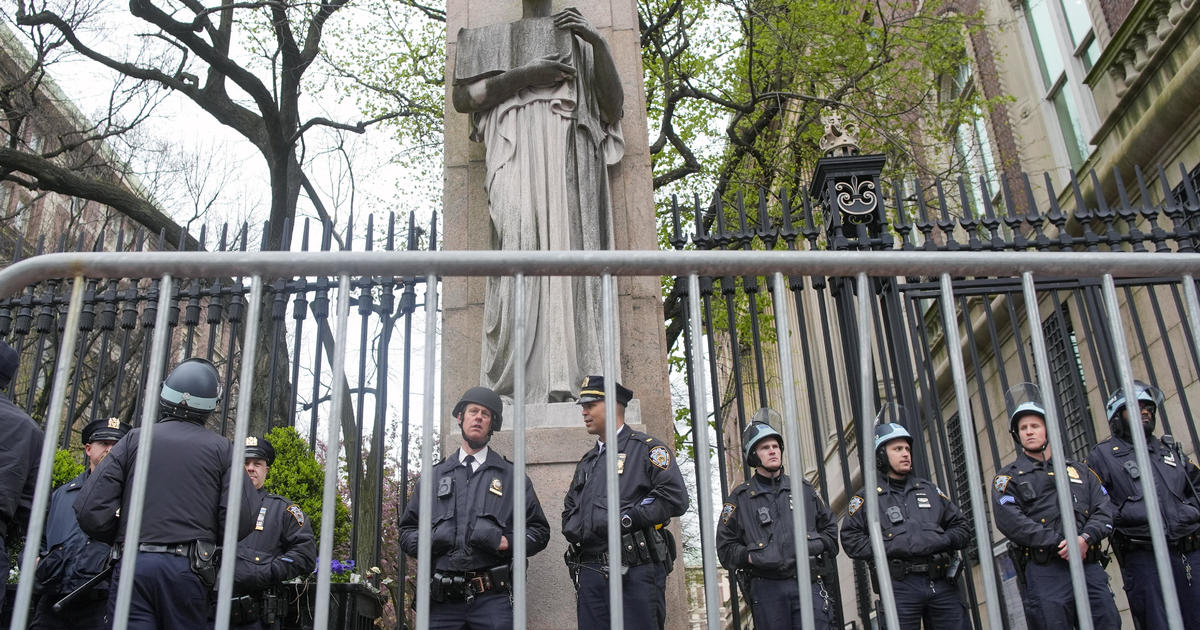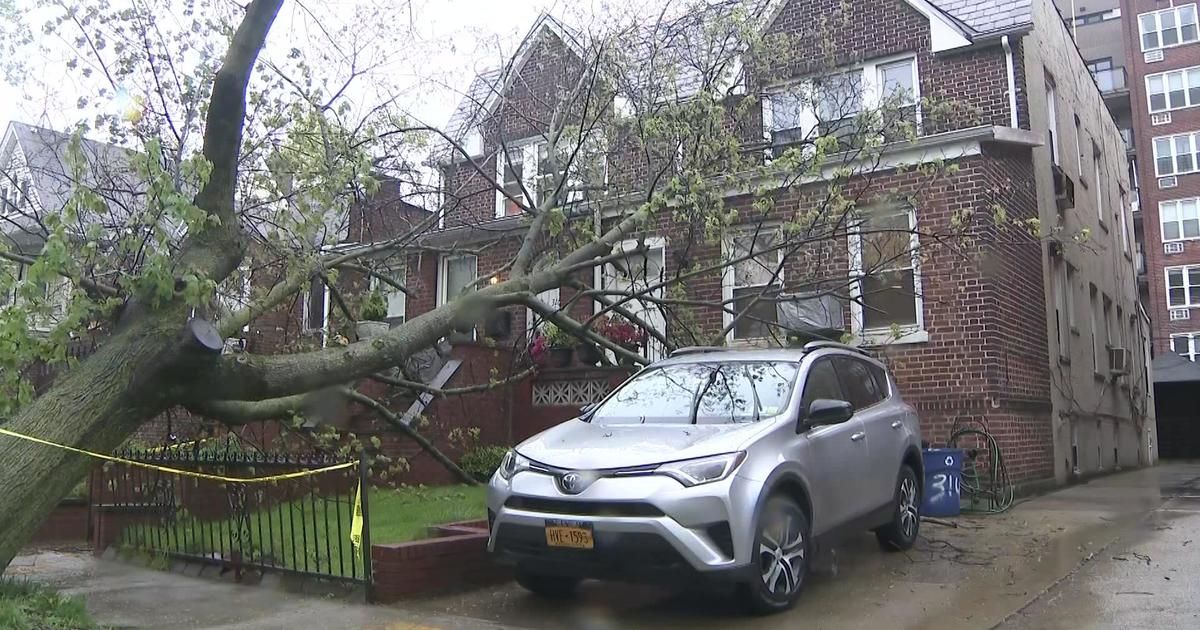Tips On Staying Safe And Warm In The Winter Months
NEW YORK (CBS New York) -- A hazardous travel advisory is in effect in New York City as the latest winter storm brings sleet and freezing rain to the region making roads and sidewalks slick and slippery. Here are some more tips from the NYC Office Of Emergency Management on staying warm and safe during the winter months.
For Motorists:
If you must drive a vehicle, monitor weather and traffic reports for the latest road conditions.
- Use major streets or highways for travel whenever possible as these roadways will be cleared first.
- Drive slowly. Vehicles, including those with 4-wheel drive, take longer to stop on snow and ice than on dry pavement.
- Keep the name and phone number of at least one local towing service in your car in case you break down or become stuck in the snow.
- If you get stuck on the road stay with your car and contact a towing company.
For Pedestrians:
- Exercise caution and avoid slippery surfaces.
- Wear layers including a hat, gloves and scarf to stay protected from the cold. And, keep clothes and shoes dry.
- Have heightened awareness of cars, particularly when approaching or crossing intersections.
Tips for Staying Warm
•Wear a hat, hood, or scarf, as most heat is lost through the head.
•Wear layers, as they provide better insulation and warmth.
•Keep fingertips, earlobes, and noses covered if you go outside.
•Keep clothing dry; if a layer becomes wet, remove it.
Clearing Snow and Dangling Ice from Roofs
- Snow and rain that collect on roofs become heavy and cause damage to buildings.
- Remove leaves and debris from roof drains to prevent water from collecting.
- In addition to cleaning out gutters, clear snow from roofs and drains.
- Flat roofs require special attention. Snow and water should be removed with drainage systems or manually.
OEM and the Department of Buildings urge building owners and managers to remove ice from their buildings where possible. If ice removal is not possible, building owners and managers should rope off the unsafe area.
Residents should take care to avoid areas roped off due to hazardous ice conditions, and be cautious of dangerous, hanging ice.
Ice Safety Tips (from NYC Parks & Recreation):
During the winter months, ponds and lakes in City parks may appear frozen, but venturing onto them is extremely dangerous and can cause potentially fatal accidents. To remind people of the dangers of thin ice, Parks & Recreation posts warning signs along the perimeter of city lakes and ponds in English and in Spanish. Special ladders are also installed around the edges of city lakes for trained personnel to use in case someone falls through the ice.
•Never go on frozen waters (unless clearly marked otherwise with official signs).
•Parents and caregivers should make sure children are never unattended near ice.
•If you hear cracking, lie down immediately to try to distribute your weight.
•If you witness someone falling through ice, never attempt to make a rescue by yourself.
•Call 911 and notify the proper authorities. Be sure to give the exact location and an account of the incident.
FIRE SAFETY:
•Use only portable heating equipment that is approved for indoor use.
•Keep combustible materials, including furniture, drapes, and carpeting at least three feet away from the heat source. NEVER drape clothes over a space heater to dry.
•Always keep an eye on heating equipment. Never leave children alone in the room where a space heater is running. Turn it off when you are unable to closely monitor it.
•Be careful not to overload electrical circuits.
Make sure you have a working smoke detector in every room. Check and change batteries often.
What to Do If You Lose Heat:
Every resident is entitled to heat and hot water. Tenants without adequate heat or hot water should first speak with the building owner, manager, or superintendent. If the problem is not corrected, tenants should call 311. The Department of Housing Preservation and Development (HPD) will attempt to contact your building's owner to get heat or hot water service restored.
If service has not been restored, HPD will send an inspector to your building to verify the complaint and issue a violation. If your landlord does not live up to his or her legal obligation, HPD will call in emergency contractors to fix the boiler or do whatever is required to get your heat and hot water working again.
For more information about loss of heat or hot water, refer to the Department of Housing Preservation and Development's frequently asked questions for tenants.
If you lose heat, take measures to trap existing warm air, and safely stay warm until heat returns:
•Insulate your home as much as possible. Hang blankets over windows and doorways and stay in a well-insulated room while power is out.
•Dress warmly. Wear hats, scarves, gloves, and layered clothing.
•If you have a working fireplace, use it for heat and light, but be sure to keep the damper open for ventilation.
•Open your faucets to a steady drip so pipes do not freeze.
•Eat. Food provides your body with needed energy to produce its own heat and drinking helps your body avoid dehydration.
•If the cold persists and your heat is not restored, call family, neighbors, or friends to see if you can stay with them.
If your service line, pipes or water meters freeze:
•Open a faucet near the frozen point to release vapor from melting ice.
•Direct a hair dryer or heat lamp at the frozen section, or put a small space heater nearby.
•NEVER thaw a frozen pipe or meter with an open flame; this could lead to fire or cause a steam explosion.
•If your meter is damaged or your pipes burst, call 311.
Learn more about water supply disruptions
If you lose power, call your power provider immediately to report the outage.
•Con Edison 24-hour hotline: 1-800-75-CONED (752-6633)
•National Grid 24-hour hotline: 1-718-643-4050
•Long Island Power Authority (LIPA) 24-hour hotline: 1-800-490-0025
If You Need Emergency Heating Assistance
The Human Resources Administration (HRA) administers the federal Home Energy Assistance Program (HEAP), which provides low-income people with emergency heating assistance. Eligible residents will receive a payment for fuel delivery, or HRA will arrange for fuel delivery or boiler repair. Emergency assistance is given to those who qualify only once per heating season. Call 311 for more information.
How To Help Others
•Infants, seniors, and people with paralysis or neuropathy are at increased risk of hypothermia and frostbite. Check on friends, relatives, and neighbors who may need assistance to ensure they are adequately protected from the cold.
•Community members that identify someone on the street they believe needs assistance should call 311 and ask for the Mobile Outreach Response Team. The Department of Homeless Services will send an outreach team to the location to assess the individual's condition and take appropriate action.
•Recognize symptoms of cold weather illnesses such as frostbite and hypothermia:Hypothermia: symptoms include slurred speech, sluggishness, confusion, dizziness, shallow breathing, unusual behavior, and slow, irregular heartbeat.
Frostbite: symptoms include gray, white or yellow skin discoloration, numbness, and waxy feeling skin.
•If you suspect a person is suffering from frostbite or hypothermia, bring him or her someplace warm and seek medical help immediately or call 911.
•If medical help is unavailable, re-warm the person, starting at the core of their body. Warming arms and legs first can increase circulation of cold blood to the heart, which can lead to heart failure. Use a blanket, or if necessary, your own body heat to warm the person.
•Do not give a person suffering frostbite or hypothermia alcohol or caffeine, both of which can worsen the condition. Instead, give the patient a cup of warm broth.



